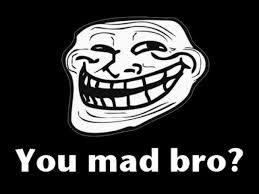In his article, Tim Adams discusses what trolling involves and what mentality trolls have because of anonymity and a general lack of rules online. Because of a perceived “mask,” people comment and post rude comments or make threatening remarks to individuals. People no longer feel the need to adhere to social normsl; Adam calls it “deindividuation.” Some troll for reactions and others do it because they are angry people. It has become a much bigger issue, however, with the emergence of comment sections on most entertainment news providing sites.
 I don’t think trolling is as serious as people make it out to be. Yes, trolling is bad; it’s annoying, inconvenient, and generally unhelpful and irrelevant. The last word is important however: irrelevant. At the end of the day, people can ignore trolls and go on with their lives, just like a person walks by strangers every day. There are so many people and so many comments that it is not necessary to give them the time of day. Perhaps that seems a bit lax but this is because I don’t consider people who use explicit/violent language to be trollers. I consider this to be harassment. I think there’s ultimately a huge difference between saying “you suck!” and “I will come to your house and slaughter you and your family.”
I don’t think trolling is as serious as people make it out to be. Yes, trolling is bad; it’s annoying, inconvenient, and generally unhelpful and irrelevant. The last word is important however: irrelevant. At the end of the day, people can ignore trolls and go on with their lives, just like a person walks by strangers every day. There are so many people and so many comments that it is not necessary to give them the time of day. Perhaps that seems a bit lax but this is because I don’t consider people who use explicit/violent language to be trollers. I consider this to be harassment. I think there’s ultimately a huge difference between saying “you suck!” and “I will come to your house and slaughter you and your family.”
Unfortunately, whatever it’s considered, there’s no real way to stop it without censoring, something that people seem to shy away from as though the rule “If you don’t have something nice to say, don’t say anything at all” isn’t still great advice. Anonymity is something that should be permitted. So many things have stigma attached to them that it benefits all to be able to hide behind a username at some point in their lives. Not only that, but not everyone believes it is necessary to have an account for every website just so that they can provide insight. It would be unfair to people who genuinely want to contribute but who feel they can’t because they can’t remain anonymous.
I don’t believe anything needs full censorship. I think the most anyone can hope to do is moderate. I believe people should be able to express themselves and their opinions, whether it be positive or negative. That being said, people can still express themselves and say what they want to say without excessive use of expletives or without the need to threaten bodily harm. And if it can’t be said, it’s because nothing was being said in the first place.
 An excellent example, if not a bit off-topic would be the game Pokémon. There used to be a time where players could nickname their Pokémon whatever they wanted. And I do mean WHATEVER. If they wanted to name it after a body part or after an expletive, they had full rights and they weren’t censored at all. It’s important to note that no one saw your Pokémon unless you were interacting through use of a (physical) link cable. In the year 2014, it is now possible that I, a 20 year old in New Jersey, can interact with a five year old playing Pokémon in Japan. Players can no longer name their Pokémon anything that they want. Curse words are not allowed, the word “kill” is not allowed, nothing negative or excessively violent is allowed. This is because gamemakers realized that as the internet gets larger and the world gets smaller, it is much easier to be exposed to all kinds of negativity. They have acted accordingly by moderating what can and cannot be said.
An excellent example, if not a bit off-topic would be the game Pokémon. There used to be a time where players could nickname their Pokémon whatever they wanted. And I do mean WHATEVER. If they wanted to name it after a body part or after an expletive, they had full rights and they weren’t censored at all. It’s important to note that no one saw your Pokémon unless you were interacting through use of a (physical) link cable. In the year 2014, it is now possible that I, a 20 year old in New Jersey, can interact with a five year old playing Pokémon in Japan. Players can no longer name their Pokémon anything that they want. Curse words are not allowed, the word “kill” is not allowed, nothing negative or excessively violent is allowed. This is because gamemakers realized that as the internet gets larger and the world gets smaller, it is much easier to be exposed to all kinds of negativity. They have acted accordingly by moderating what can and cannot be said.
WordPress already employs this; in the settings for comments on our personal blogs, we are able to blacklist any words we do not want a commenter to be able to post. This needs to be adopted by more websites so that, for the most part, no one is censored, people can remain anonymous, and people can still contribute and express themselves and their opinions.

